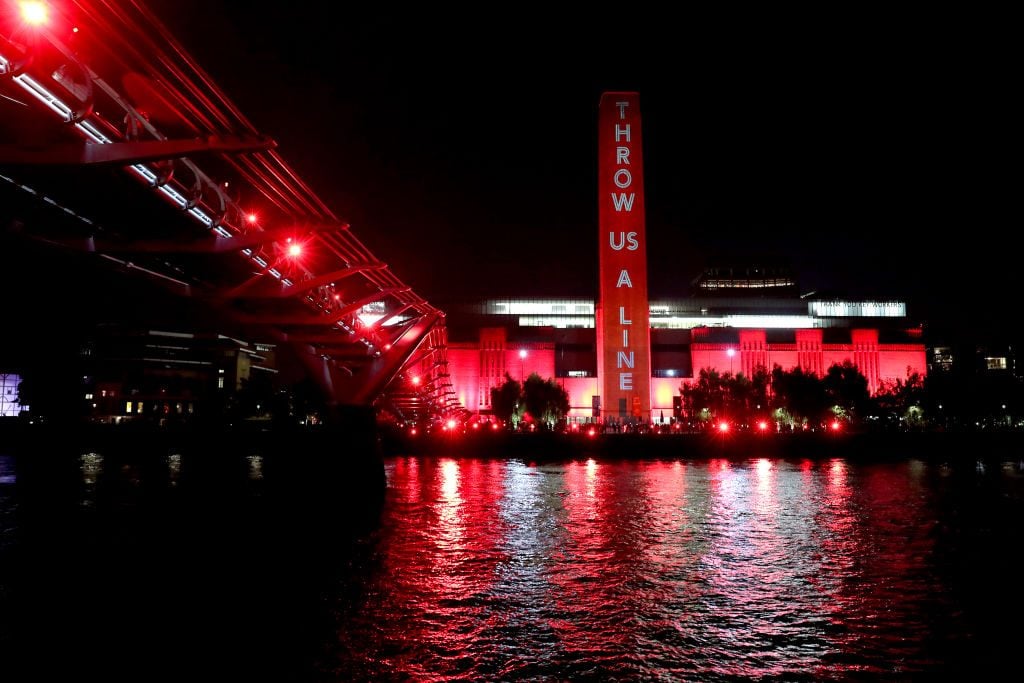Art World
Tate Workers Are Going on Strike and Picketing the Museum After It Cut More Than 300 Jobs From Its Commercial Arm
Tate plans to cut 300 jobs from its commercial arm.

Tate plans to cut 300 jobs from its commercial arm.

Naomi Rea

More than 100 staff members at the Tate galleries in England began an indefinite strike on Tuesday morning to protest the institution’s announcement that it would cut more than 300 jobs from its commercial arm, Tate Enterprises.
The institution first notified staff of restructuring plans that would threaten these jobs in mid-June. Tate members of the PCS union overwhelmingly voted to strike on August 4, with 88.6 percent of a high-turnout ballot voting in favor unless Tate pledged to save the at-risk jobs. The gallery confirmed on August 12 that it would make 313 staff redundant, setting the strike in motion.
“The union will support members all the way to get a just settlement, no matter how long it takes,” PCS general secretary Mark Serwotka said in a statement.
Tate Enterprises operates the retail, catering, and publishing services across all four Tate galleries.
Tate’s director, Maria Balshaw, confirmed the redundancies in an email to employees, saying the gallery was forced to the “painful and difficult decision” due to an anticipated loss of revenue from “the long-term drop in visitor numbers we are expecting for the foreseeable future.” Tate’s four locations reopened to the public on July 27 with reduced capacity.
In her email, Balshaw said the gallery had already used £5 million of its reserves to retain staff this far into the shutdown and that leadership is working to ensure that Black, Asian, and minority ethnic employees are not “disproportionately affected by the restructure.” Final decisions on redundancies are expected in mid-September.
![The picket line at Tate Modern on August 18, 2020. Photo courtesy Justice for Workers [Goldsmiths] @CleanersFor on Twitter.](https://news.artnet.com/app/news-upload/2020/08/tate-strike-1-1024x768.jpeg)
The picket line at Tate Modern on August 18, 2020. Photo courtesy Justice for Workers [Goldsmiths] @CleanersFor on Twitter.
The striking workers have made three demands. First, they are asking that 10 percent of an anticipated £7 million in additional funding that Tate will receive from the government is invested in Tate commerce. Second, that no redundancies are made while senior staff still earn six-figure salaries. Finally, they want the museum to stand with the union in demanding more government aid if the bailout money is not enough to meet their demands.
?Our reasonable demands?
Tate’s values are supposed to be Open, Kind, Bold and Rigorous? ? pic.twitter.com/dHvvcPuJVI— PCS Tate United (@Tate_United) August 18, 2020
Staff have begun the strike today and will be picketing outside the galleries through August 22, followed by an indefinite strike from August 24. Although not all staff are picketing, the protests have left a number of Tate gift shops closed. (In front of one, a sign reads, “This shop is closed due to industrial action.”) The union has asked those demonstrating to socially distance and wear face masks, and is calling for donations to a fundraiser to support the strikers.
The nearby Southbank Centre, Europe’s largest single-run arts centre, has also announced plans to cut more than 400 jobs. PCS union conducted a vote among its Southbank Centre members on August 10 regarding whether to strike after the institution announced cuts to its redundancy pay packages. (The outcome of the vote has not yet been made public.)
In a statement of solidarity with the strikers, the director of the contemporary arts organization Book Works, Gavin Everall, said that it is “grotesque” that the job cuts will disproportionately affect low-paid, Black and ethnic minority workers.
“All arts organizations are facing a tough future—but it is completely unacceptable that two of the largest public institutions are further exacerbating this crisis by imposing redundancies in the midst of a pandemic,” Everall said.